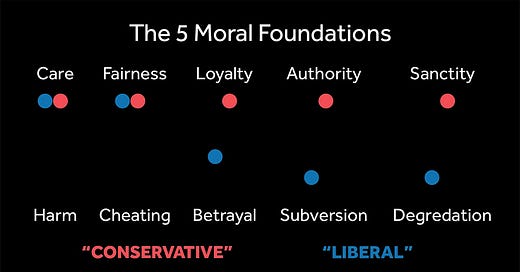Moral Frames and Moral Foundations in political discourse
Framing an issue through the moral lens of a group or individual is the key to political discourse
For anyone familiar with Jonathan Haidt’s Moral Foundations Theory (MFT), you should understand how important word choice is when discussing contentious moral issues. The wrong word triggers an undesirable conceptual mapping in the brain, after all, words are just combinations of phonemes (sounds) that represent different concepts, and the correct sounds evoke the desired concepts in the mind of your interlocutor. So why is it that when you explain your beliefs to someone of a different political orientation, on a moral issue that you feel is important, communication often breaks down at a particular point, often after a specific choice of phrasing? Rather than diving into Jonathan Haidt’s work, which I encourage anyone to do in their own time, I will highlight the work of George Lakoff, one of Haidt’s influences in the field of moral foundations in political discourse.
Lakoff’s concept of ‘moral frames’ is a must-know for anyone working in politics, conflict resolution, or anyone seeking to understand political polarization at all. Haidt’s MFT posits that there are different moral foundations that conservatives and liberals value and weight differently. Lakoff’s moral frames suggests that its not what you say, but how you say it which impacts how persuasive you are and how your message is perceived.
One study that has stuck with me for years exemplifies the theories of both these scholars. Feinberg & Willer (2013) was a revelation for me because it clarified the concept of disparate moral concerns and framing in an intuitive way. The collection of studies analyzed the moralized language used by conservatives and liberals on environmental issues. It is generally understood that extreme opponents of climate friendly policies fall on the conservative side of the aisle and that the most ravenous supporters of green policies fall on the left or liberal side of the aisle. According to Haidt’s MFT, the moral foundation of Care and its negative correlate Harm is most important for liberals, whereas conservatives value a wider array of moral foundations and place less emphasis on the Care/Harm axis.
One of the moral foundations valued by conservatives and not by liberals is the Purity or Sanctity foundation and its binary opposite, degradation. For conservatives, and primarily religious conservatives, the moral virtues of Sanctity and Purity are important, evidenced by the various ritual practices related to maintaining the purity of sanctified objects, such as a tabernacle in Christian contexts or the Torah in Jewish contexts. Maintaining the sanctity of these objects is conceptually linked to bodily purity, a ubiquitous religious ideal, and degradation of these objects is viewed as a moral infraction. Those who come from WEIRD countries (Western, educated, industrialized, rich and democratic) typically were not conditioned to recognize this moral foundation as relevant. For them, almost every moral issue is viewed through the lens of reducing harm.
Now what’s interesting is that in the Feinberg & Willer study, the application of different moral frames was understood as central to the polarization around the environmental debate. Study 3 “showed that presenting conservatives with pro-environmental messages couched within a particularly conservative moral domain (e.g. purity instead of harm) led them to adopt more pro-environmental attitudes, comparable to those of liberals” (pg.61).
So when hardline conservatives that view environmental policy as a moral concern of the ‘out-group’ (liberals) are presented with the same green policies but through the lens of protecting the purity and sanctity of the sacralized object that is the earth, they respond well. This is contrasted with the conventional moral frame which is that we are ‘harming’ future generations, or that we are ‘harming’ the earth, where the planet is personified and we must care for it. Therefore, you can have ideologically or morally opposed people acquiesce to a viewpoint or a policy which they would typically consider a non-starter; it all comes down to how well you understand their moral foundations and subsequently, how you frame the issue morally.
Essentially, the moral frame you employ to discuss a policy issue will determine how you garner support for your position. Evoking the correct moral foundations is the key to persuasive political discourse during the current era of heightened polarization. By understanding an opposing group’s moral foundations on an authentic and intuitive level, as opposed to a superficial level, we can address contentious topics through the right moral frames and, in so doing, we can orient ourselves towards positive discourse instead of tribalism, demonization, and othering of those that disagree with us.





